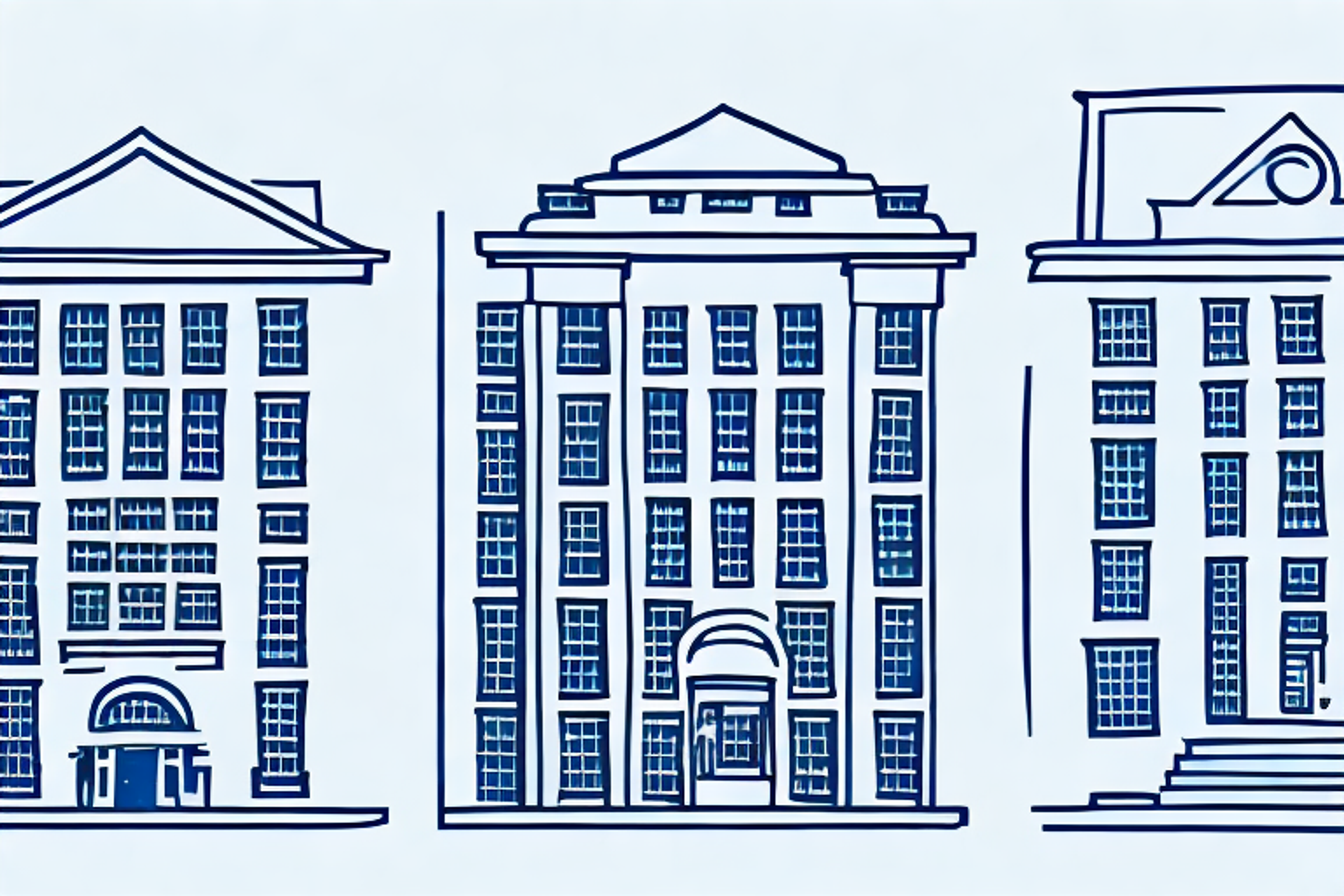Columbia Law School Vs. Cornell Law School: An In-Depth Comparison
Are you torn between Columbia Law School and Cornell Law School? This in-depth comparison article will help you make an informed decision by analyzing the key differences and similarities between these two prestigious institutions.
Posted March 6, 2025

Table of Contents
When it comes to deciding where to attend law school, there are a plethora of factors to consider. Two prestigious, Ivy League institutions that often make the list of top law schools in the country are Columbia Law School and Cornell Law School. Let's take a closer look at the similarities and differences between these two schools to help you make an informed decision.
Cornell Law School
Located in the quaint town of Ithaca, New York, Cornell Law School is known for its small class sizes, tight-knit community, and strong emphasis on public service. The school boasts a highly distinguished faculty that includes prominent legal scholars and practitioners.
Additionally, Cornell Law School offers a wide range of clinics and externships that allow students to gain practical experience in various areas of law. These opportunities include working with local non-profit organizations, government agencies, and private law firms. Students can also participate in moot court competitions and other extracurricular activities that help them develop their legal skills and network with professionals in the field.
Admissions Process and Requirements: Columbia vs. Cornell Law School
The admissions process for both Columbia and Cornell Law Schools is extremely competitive, with acceptance rates hovering around 15%. Columbia places heavy emphasis on your undergraduate GPA and LSAT scores, while Cornell considers a wide range of factors, including your character, background, and potential for success in the legal profession. Both schools require applications to be submitted via LSAC and have application deadlines in February.
It is important to note that both Columbia and Cornell Law Schools also offer early decision options for applicants. Early decision is a binding agreement, meaning that if you are accepted, you must attend that school and withdraw all other applications. This option can increase your chances of acceptance, but it is important to carefully consider your options before committing to a binding agreement.
Curriculum and Course Offerings: Columbia vs. Cornell Law School
Columbia Law School emphasizes a traditional, theoretical approach to legal education, with a focus on developing critical thinking and analytical skills. The curriculum is heavily centered on foundational subjects such as contracts, torts, and civil procedure. Cornell, on the other hand, offers a more flexible curriculum that allows students to specialize in areas such as international law, dispute resolution, and intellectual property.
Another key difference between the two law schools is the size of their class offerings. Columbia Law School has a smaller student body, which allows for more intimate class sizes and greater opportunities for one-on-one interaction with professors. Cornell Law School, on the other hand, has a larger student body, which can provide students with a more diverse range of perspectives and experiences.
Additionally, Columbia Law School has a strong focus on public interest law and social justice issues. The school offers a variety of clinics and programs that allow students to gain hands-on experience in areas such as human rights, environmental law, and criminal justice reform. Cornell Law School also offers opportunities for students to engage in public interest work, but the emphasis is not as strong as it is at Columbia.
Faculty and Teaching Styles: Columbia vs. Cornell Law School
Both schools employ a diverse and talented faculty, but their teaching styles differ. Columbia professors tend to adopt a more formal lecture-based approach to teaching, while Cornell professors place more emphasis on interactive classroom discussions and hands-on learning opportunities.
Despite the differences in teaching styles, both Columbia and Cornell Law School have highly respected faculty members who are experts in their respective fields. Columbia Law School boasts of having several Nobel laureates and Pulitzer Prize winners among its faculty members. Cornell Law School, on the other hand, has a faculty that includes former judges, practicing attorneys, and legal scholars who have published extensively in their areas of expertise.
Another notable difference between the two law schools is the size of their classes. Columbia Law School has a smaller student-to-faculty ratio, which allows for more personalized attention and interaction between students and professors. Cornell Law School, on the other hand, has a larger student body, which provides students with a more diverse range of perspectives and experiences.
Student Life and Activities: Columbia vs. Cornell Law School
In terms of student life, both schools offer a vibrant community with a variety of extracurricular activities and organizations to get involved in. Columbia is located in bustling New York City, providing easy access to a variety of cultural and professional opportunities, while Cornell is nestled in the beautiful natural surroundings of upstate New York, offering a more laid-back lifestyle.
At Columbia Law School, students can participate in a wide range of student-run organizations, including the Columbia Law Review, the Columbia Business Law Review, and the Columbia Human Rights Law Review. Additionally, the school has a strong tradition of public interest work, with many students participating in clinics and pro bono projects throughout their time at the school.
At Cornell Law School, students can take advantage of the school's close proximity to the Finger Lakes region, which offers a variety of outdoor activities such as hiking, skiing, and boating. The school also has a strong commitment to public service, with many students participating in clinics and externships that focus on serving underserved communities.
Career Opportunities and Job Placement: Columbia vs. Cornell Law School
Both schools have strong reputations and boast impressive employment statistics. Columbia has a reputation for placing graduates in high-paying positions at prestigious law firms, while Cornell has a strong public-interest-oriented focus and is known for its successes in government and public service positions. Both schools have extensive networks of alumni who are actively involved in mentoring and recruiting current students.
However, there are some differences in the job placement outcomes between the two schools. According to recent data, Columbia graduates tend to have a higher median starting salary compared to Cornell graduates. On the other hand, Cornell graduates have a higher percentage of graduates employed in clerkships, which are highly competitive positions that provide valuable experience for future legal careers. Additionally, Cornell has a strong emphasis on practical skills training, with opportunities for students to participate in clinics and externships that provide hands-on experience in various legal fields.
Tuition and Financial Aid Comparison: Columbia vs. Cornell Law School
As with most law schools, tuition and living expenses can be a significant factor in your decision. Columbia is one of the most expensive law schools in the country, with tuition and fees exceeding $70,000 per year. Cornell is relatively more affordable, with tuition and fees slightly above $60,000 per year. However, both schools offer robust financial aid programs to help offset these costs.
It's important to note that the financial aid packages offered by Columbia and Cornell differ in some ways. Columbia Law School offers need-based grants, which do not need to be repaid, as well as federal loans and work-study programs. Cornell Law School also offers need-based grants, as well as merit-based scholarships and federal loans. Additionally, Cornell has a Loan Repayment Assistance Program (LRAP) for graduates who pursue public interest or government work, which can help alleviate the burden of student loan debt.
Alumni Network and Reputation: Columbia vs. Cornell Law School
Both schools have produced numerous distinguished alumni who have gone on to successful careers in law, politics, and business. Columbia's alumni network is particularly strong in the legal and financial fields, while Cornell's alumni are heavily represented in government and public service. Both schools have strong regional reputations in their respective locations.
However, Columbia Law School has a more global reputation and is often ranked higher in national and international law school rankings. This is due in part to its location in New York City, which provides students with access to top law firms and legal organizations. Cornell Law School, on the other hand, is located in Ithaca, a smaller city in upstate New York, which may limit its students' exposure to certain legal opportunities. Nonetheless, both schools offer excellent legal education and opportunities for their students to succeed in their chosen fields.
Rankings and Accolades: Columbia vs. Cornell Law School
Both Columbia and Cornell consistently rank among the top law schools in the country. According to US News & World Report, Columbia is currently ranked #4, while Cornell is ranked #13.
In addition to their overall rankings, both Columbia and Cornell have received recognition for their specialized programs. Columbia Law School's program in Environmental Law is consistently ranked #1 in the country by US News & World Report. Cornell Law School's program in International and Comparative Law is also highly regarded, and has been ranked #1 in the country by the same publication in the past.
Furthermore, both schools have a strong reputation for producing successful graduates. Columbia Law School boasts an impressive list of alumni, including three US Presidents and numerous Supreme Court Justices. Cornell Law School has also produced notable alumni, such as former US Senator and Secretary of State Edmund Muskie.
Notable Programs and Centers: Columbia vs. Cornell Law School
Columbia Law School is home to several notable programs and centers that focus on areas such as human rights, gender and sexuality, and international law. Cornell's offerings include programs in dispute resolution, animal law, and law and entrepreneurship.
In addition to these programs, Columbia Law School also has a renowned program in environmental law, which includes the Sabin Center for Climate Change Law. The center provides resources and research on climate change law and policy, and hosts events and conferences on the topic.
On the other hand, Cornell Law School has a strong focus on technology and innovation, with its Technology, Innovation, and Entrepreneurship concentration. This program offers courses on intellectual property, privacy, and cybersecurity, and provides opportunities for students to work with startups and entrepreneurs.
Diversity and Inclusion Comparisons: Columbia vs. Cornell Law School
Both schools have made strides in recent years to promote diversity and inclusion in their communities. Columbia has a robust pipeline program for underrepresented students, while Cornell has a strong commitment to promoting diversity in its admissions process and curriculum.
Student Success Stories from Both Schools
Graduates from both Columbia and Cornell Law Schools have gone on to achieve great success in their legal careers. Some notable alumni from Columbia include Ruth Bader Ginsburg, former US Attorney General Eric Holder, and former NYC Mayor Michael Bloomberg. Cornell's alumni include former Senate Majority Leader Tom Daschle, US Representative Pramila Jayapal, and former NYC Mayor David Dinkins.
How to Decide Which One Is Right for You?
Ultimately, the decision of where to attend law school is a deeply personal one that should be based on your individual goals, interests, and priorities. Factors such as location, area of specialization, teaching style, and career opportunities should all be taken into account. Visiting both campuses and speaking with current students and alumni can also be helpful in making your decision.
In conclusion, both Columbia and Cornell Law Schools are highly reputable institutions that offer their own unique strengths and opportunities. By carefully considering your needs and priorities, you can make an informed decision that will set you on the path to a successful legal career.











